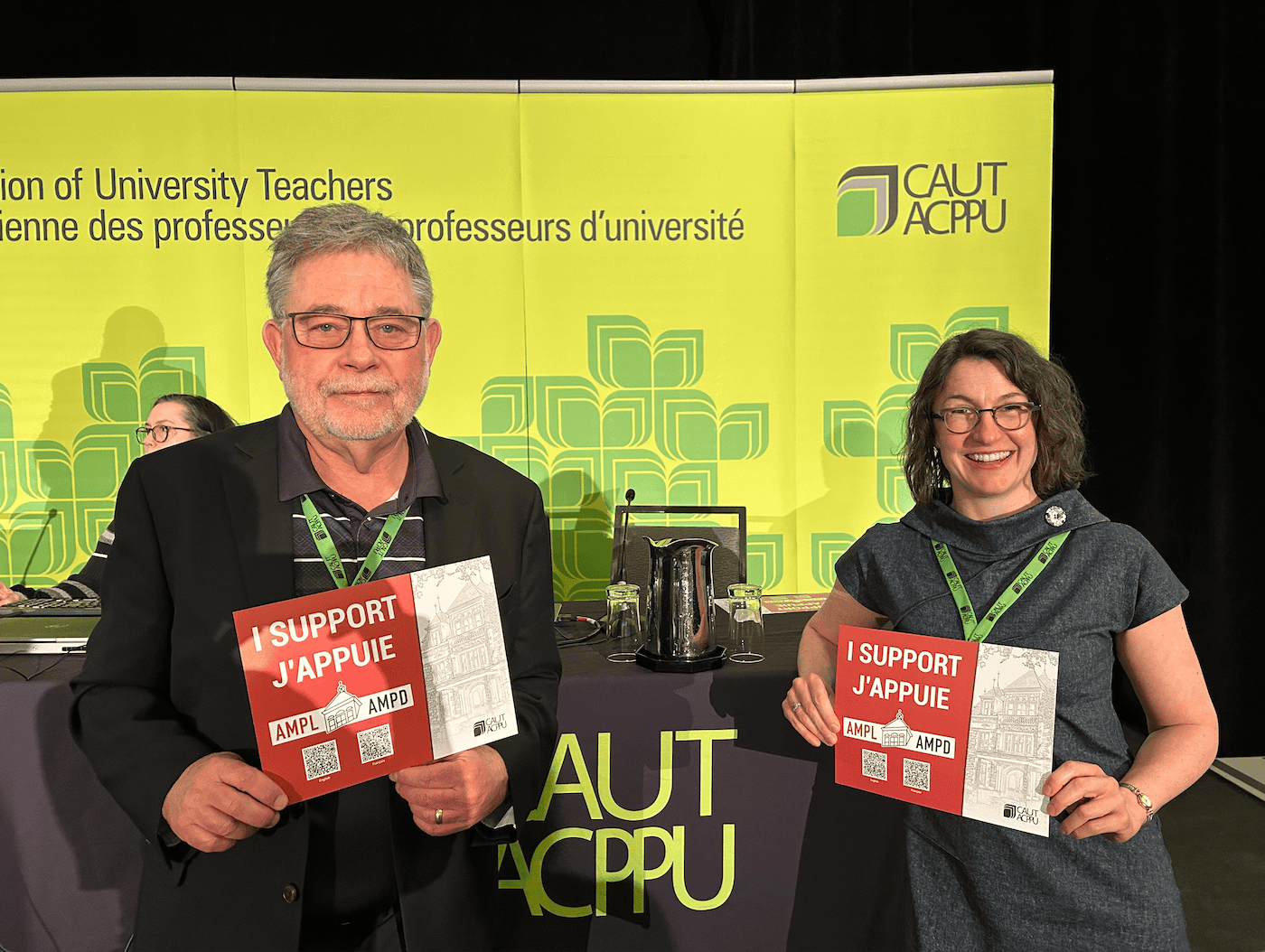
ABOVE: AASUA President Gordon Swaters and VP Kristine Smitka hold signs in support of the Association of McGill Professors of Law (AMPL) Strike.
The role of algorithms in post-secondary education, an ongoing strike at McGill, and academic staff members’ mental health were key topics of discussion the 96th Canadian Association of University Teachers (CAUT) Council which ran April 25-27.
CAUT Council is where academic staff union leaders from across Canada meet. In attendance from AASUA were President Gordon Swaters, Vice-President Kristine Smitka, Associate Director of Operations Roxanne Rowe, and Communications Officer Rachel Narvey.
The algorithm is watching
The use of third-party technology on campus might mean staff and students are under observation without even knowing.
That’s what University of Waterloo students discovered when a
malfunctioning vending machine revealed the snack dispensers were secretly using facial recognition technology. Users had no idea they were being recorded or monitored as they were making their purchases.
This is only one extreme example of the issues brought on by the use of algorithms in higher education, Kate Cushon, then-chair of CAUT’s Librarians' and Archivists' Committee, said during a group discussion devoted to the topic.
Algorithms can modify themselves with minimal human input, and can be found in exam proctoring software, plagiarism detection software, writing assistant and text generation software, as well as image touch-up and generation software.
Another example of algorithms being using in higher education includes exam proctoring software Proctorio, which analyzes webcam data for irregularities that might indicate cheating.
Ian Linkletter, a former University of British Columbia learning technology specialist in the Faculty of Education, used online videos in 2020 to explain how the software worked in the aim of giving students a greater understanding of the tools. The videos led Protcorio to file a
lawsuit against Linkletter.
Linkletter’s legal battle is ongoing.
“The technology train has left the station,” one of the discussion attendees noted, as these tools, from cyber security tools software like SentinelOne, to Microsoft Outlook and teams, and “permeate every aspect of our working lives.”
However, understanding and education can still go a long way. Attendees agreed that it is vital to increase literacy on campus regarding the potential harms of the algorithmic software and ensure staff and student agency in their application.
President of McGill Law Professors gives update on strike
The Association of McGill Law Professors (AMPL) has been on strike since April 24, the first instance of job action for the new union which applied for certification only a year ago.
Evan Fox-Decent, AMPL President and a McGill law professor, described the change he has seen in his faculty since becoming a union.
“Our faculty was down at six to eight people showing up at faculty events three years ago,” he said, noting now they consistently have 90%.
The strike is in response to a breakdown in negotiations where AMPL’s Employer will
not set dates to come to the bargaining table.
The union is fighting for strengthened collegial governance and equity measures, as well as improved working conditions.
Fox-Decent thanked CAUT for helping McGill Law professors organize. He was presented with a check for $1-million from the CAUT Defence Fund to back AMPL up in their strike efforts.
The
CAUT Defence Fund, which AASUA contributes to, provides integral assistance to its members once they hit the line. The Fund primarily offers financial support such as strike pay.
“The sense of community that we have gained and come to appreciate is thanks to you,” Fox-Decent said. So many of you have sent thousands and thousands of dollars, and we have made it known to our administration that we will be there on the picket lines until we have a fair agreement.”
'Medieval' approaches to mental health
Universities are hypocritical when it comes to mental health, Ivy Lynn Bourgeault, a University of Ottawa sociological and anthropological studies professor, told attendees.
“We promote science and knowledge, but we actually don’t actually integrate it in the day-to-day,” Bourgeault said. “We are still living and working in what is in this respect a medieval institution.”
Bourgeault shared her findings from a survey on mental health in the academic workplace, which included 354 academics of an average age of 49 who were tenure-track professors, professors with tenure, and teaching staff on contract.
The results highlighted the stigma surrounding mental health issues in academia, the lack of support structures, and the pressure to prioritize work over well-being.
“Presenteeism is what we call it when you are at work, but you probably shouldn’t be,” Bourgeault said. “Ninety percent of the participants indicated that they did this and it had an impact on their productivity.”
According to her findings, Bourgeault said negative impacts of mental health in academia are most experienced by women and racialized academics.
“Black and Indigenous People of Colour (BIPOC) women were more likely to report mental health issues than BIPOC men,” Bourgeault said.
She also highlighted that though BIPOC are less likely to take a leave for mental-health related-reasons, they were also less likely to return to work afterwards. Bourgeault hypothesized this is due to a lack of accommodations in coming back to work.
To help address the problem of mental health in the workplace, Bourgeault and her colleagues have developed a toolkit based off their research findings. The toolkit includes a wellbeing resource hub and a resource called “Clearing your Plate” an “an idea for an individual-level intervention that academics can consider to help manage their workload.”
The Toolkit also includes items for University Administration and Human Resources to implement. You can view the toolkit here: https://www.mhcaretoolkit.ca/academia-toolkit